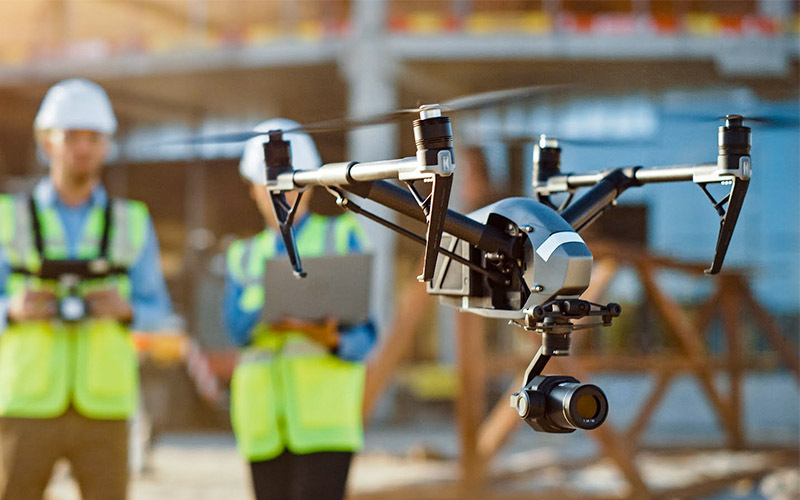No products in the cart.
The Benefits of Commercial Drones for Roof Inspections And How To Get Started

Drones are becoming increasingly popular in a variety of industries for conducting a wide range of tasks, including roof inspections. There are many benefits to adopting drones in conducting roof inspections, such as increased safety, the ability to collect more in-depth data, minor inconvenience to the customer, faster results, and saving money.
In this blog post, we will explore these benefits in more detail and summarize the FAA certifications required to fly a drone and the various laws businesses need to be aware of when using drones for commercial purposes.
The Benefits Of Drones For Roofing Companies
Drones are a great technology to implement at your roofing company. By utilizing drones for building inspections, your company can set itself apart from the competition while scaling your business at the same time.
Here are some of the amazing benefits of implementing drone inspections for roofs:
Safer Roof Inspections
One of the main benefits of drones is that they can increase safety for both the roofing company employees and the customers.
Conducting a rooftop inspection with a drone eliminates the need for employees to physically climb onto roofs
Conducting a rooftop inspection with a drone eliminates the need for employees to physically climb onto roofs, which reduces the risk of accidents and injuries. It also means that there are less expensive insurance costs for employees who are conducting roof inspections.
Your employees will appreciate your attention to their safety and they will likely be excited about the potential of learning a new skill. If you don't already have an inspection team that knows how to operate a drone, adding the certification to your employee benefits will help boost retention and attract new employees. Your company can also look into hiring a certified commercial drone pilot.
Read more: Retaining Top Talent: Tips For Roofing Companies
In-depth Data Collection
Another benefit of drones is that they can collect more in-depth data than a human inspector. This is because drones are equipped with high-quality cameras and sensors that can capture detailed images and measurements of the roof. This data can be used for more detailed inspection reports to identify potential problems, such as leaks or weak areas, and to create a more accurate repair estimate than a human worker could achieve.
Additionally, drones can be operated remotely, which means that the property owners do not need to be present for the inspection.
In an increasingly competitive industry, your roof inspection company can set itself apart by offering the convenience of drone inspections to boost customer satisfaction.
Read more: How To Grow And Scale Your Roofing Business
Faster Results In A Shorter Inspection Time
Another benefit of drones is that they can provide faster results than traditional inspection methods. This is because drones can cover a larger area in a shorter period of time and the data can be processed more quickly. This means that customers can receive their repair estimate sooner, which can lead to a quicker repair.
Inspection Cost Savings
Finally, drones can help roofing companies save money. This is because drones can reduce the number of people, ladders, scaffolding, and other climbing equipment required for a regular roof inspection job. Additionally, drones can be used to conduct multiple inspections per day, which can lead to increased efficiency and productivity.
How To Implement Commercial Drone Roof Inspections
Now that we have explored some of the benefits of drones for roof inspections, let's take a look at how to implement them.
If you are a roofing company that is interested in using drones for your business, the first step is to study for the FAA Certified Drone Pilot Knowledge Test. To operate a drone for commercial purposes, such as conducting roof inspections, businesses must obtain a certification from the Federal Aviation Administration (FAA).
Before you purchase a drone, it is best practice to do your research on drone regulations, aerial vehicles, and drone technology so you are prepared for your knowledge test.
Once you own a commercial drone you must obtain an FAA tracking number and register your drone with the FAA Drone Zone.
Once you own a commercial drone you must obtain an FAA tracking number and register your drone with the FAA Drone Zone. Registration only costs 5 dollars and it is valid for three years.
The FAA offers two types of certifications: a Remote Pilot Certificate and an Operator Certificate. The Remote Pilot Certificate is for drones that weigh less than 55 pounds, while the Operator Certificate is for drones that weigh more than 55 pounds.
To obtain a Remote Pilot Certificate, you must be at least 16 years old and have a valid form of identification, such as a driver's license. You will also need to pass the FAA Certified Drone Pilot Knowledge Test, which covers topics such as drones, airspace, and weather.
Once you have your certification, you will need to follow the FAA's rules and regulations for flying drones. These include flying during daylight hours, maintaining a visual line of sight with the drone at all times, and staying below 400 feet. Additionally, you must avoid flying near airports, people, and other buildings.
By following these steps, you can ensure that you are safely and legally flying drones for your roofing business. Implementing drone roof inspections can help your business in a number of ways, from increasing safety to saving money. With the right preparation, you can make sure that you are using drones correctly and efficiently.
AMSI Supply is dedicated to providing everything needed for the metal roofer to succeed. Read our blog for more roofing company tips like How to Successfully Start Your Metal Roofing Company in 2022.
Contact Us today to learn more about our standing seam metal roofing tools and supplies.